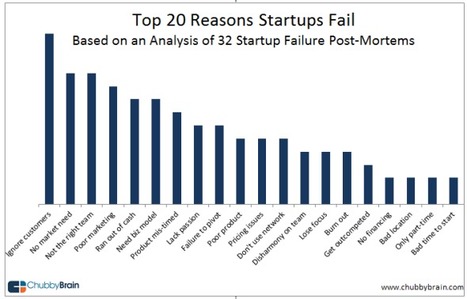Robin Good: Interesting article on the New York Times reporting on the analysis done by Prof. Noam Wasserman, who has been hunting for many years to identify the reasons why startups and those who lead them fail so often.
Having recently published his findings in a book entitled “The Founder’s Dilemmas: Anticipating and Avoiding the Pitfalls That Can Sink a Startup” he has shared with Jessica Burder of the NYT some interesting insight from his research.
Here a few of interesting thing Prof. Wasserman has discovered:
a) Startup partnerships done with friends, relatives or family are very risky.
b) Dividing equity very early in the game is not a good idea.
c) CEO replacement is organic, especially if you have a good one.
Quite interesting. 7/10
To find out the reasons why, check the full article here: http://boss.blogs.nytimes.com/2012/05/25/a-harvard-professor-analyzes-why-start-ups-fail/?partner=rssnyt&emc=rss
 Your new post is loading...
Your new post is loading...
 Your new post is loading...
Your new post is loading...













Andrew Chen asks why we are so bad at predicting successful startups. He writes: "...we’re all so bad at predicting what will work and what won’t. I’ve written about my embarrassing skepticism about Facebook, but hey, I’m just a random tech guy.
For the folks whose job it is to professionally pick winners, the venture capitalists, they aren’t doing very well either.
It’s been widely noted that the venture capital asset class, after fees, has lagged the public markets- you’d be better off buying some index funds."
In his view, much of the disappointing results are due to the "generic startup advice" being offered online. He writes that generic principles cannot be effectively applied to all situations. And he is right.
But more than anything Andrew stops at analyzing what are the kind of people who often provide such predictions and strategic advice:
"[There are] two categories: hedgehogs, who view the world through the lens of a single defining idea and foxes who draw on a wide variety of experiences and for whom the world cannot be boiled down to a single idea."
"...Silver clearly identifies as a fox, and contrasted his approach to the talking head pundits that dominate political talk shows on TV and radio. For the pundits, the more aggressive, contrarian, and certain they seem, the more attention-grabbing they are.
Rather similar to what we see in the blogosphere, where people are rewarded for writing headlines like “10 reasons why [hot company] will be killed by [new product].” Or “Every startup should care about [metric X]” or whatever."
"The solution to all of this isn’t easy- to be a fox means to draw from a much broader set of data, to look at the problem from multiple perspectives, and to reach a conclusion that combines all of those datapoints."
"Over my 5 years in Silicon Valley, the biggest lesson I’ve learned from trying to predict startups is calibration. They talk about it in the video above, but the short way to describe it is to be careful with what you think you know versus what you don’t."
Insightful. Right on the mark. 8/10
Full article: http://andrewchen.co/2013/04/08/why-are-we-so-bad-at-making-startup-predictions/
(Image credit: Red fox - Shutterstock)